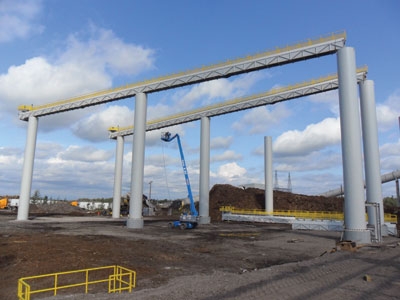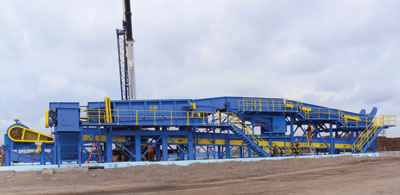
New Gear
Equipment
Sawmilling
Biomass goes big at Boralex
The thermal power generating station in Senneterre, Que. represents a total installed capacity of 34.6 MW, producing steam and electricity from wood waste or forest biomass. The electricity produced is sold to provincial utility Hydro Quebec under the terms of a 25-year contract. It consumes 400,000 tons of waste wood per year and can produce 232.5 GWh of electricity annually.
December 5, 2011 By Boralex and Aciers JP (JP Steel)
 The spreader-conveyors under construction at the Boralex plant. The thermal power generating station in Senneterre
The spreader-conveyors under construction at the Boralex plant. The thermal power generating station in SenneterreThe ash generated by the plant, estimated at 35 tons per day, is spread over agricultural land as neutralizing agents and fertilizers. A draft project to add value to the ash is also currently under study.
The plant also adds to the economic growth of this forest-dependent region, particularly the town of Senneterre itself. More than 30 employees work directly for the plant while another fifty work indirectly to supply it with fibre and other services. All contribute to the daily operation of the plant.
In order to continue its operations, Boralex needed to find a solution to a growing number of challenges. The sluggish U.S. economy and the reduction in Crown forest allocation in northwestern Quebec have resulted in the temporary and even permanent closure of several area sawmills. This has resulted in biomass having to be sourced from greater distances, driving up transport costs. The alternative is the prohibitive cost of maintenance incurred as a result of consumption of bark from heritage sites without pre-treatment. Boralex had to accept the facts – forest biomass was not necessarily an obvious solution to its supply woes, as the costs of accessing and using this material seemed prohibitive.

Ready to do anything to continue its operations and ensure profitability, Boralex actively sought innovative and creative solutions. After some involved discussions and brainstorming with Aciers JP (JP Steel), an entrepreneurial company from La Reine, a major upgrade project was conceived. Known for its mining and forestry material handling and processing expertise, Aciers JP had found a solution.
The project involves using new types of modified equipment to prepare the available fibre. Screens, debarkers, conveyors, chippers and other aggressive gear give Boralex the ability to extract the wood fibre surrounding both old and fresh bark. The fibre is cleaned, debarked, and made into chips to give it added value. Boralex can also recover bark from the area’s many heritage sites, and can prepare it for burning by extracting rocks, gravel, sand, steel and other non-combustible waste. Finally, Boralex can stack the cleaned bark in the yard to allow conditioning before combustion.
Thanks to this innovative and creative approach, Boralex has ensured its supply of biomass for the plant while making optimal use of its fibre, and has reduced the maintenance costs of its existing equipment (grinder, boilers, conveyors, etc.), thereby improving the overall effectiveness of its power plant.
The local environment is also a winner, as Boralex is cleaning up the region’s heritage bark piles. “Act today for tomorrow” is the company’s mission statement, as it considers environmental issues as a key priority in all management or business development decisions.
With this project Boralex not only maintains some 80 jobs, but has also created another 135 jobs for the duration of the project and created a hub around which other plants can be built. An understandably proud Boralex team sees this accomplishment as a testament to its greatest strength – its human resources.
Article prepared and submitted by Boralex and Aciers JP (JP Steel).
Print this page